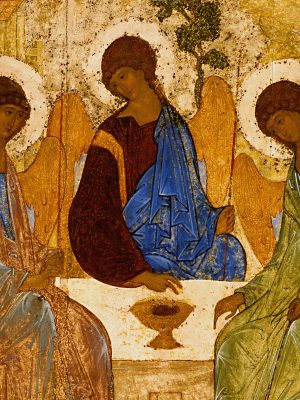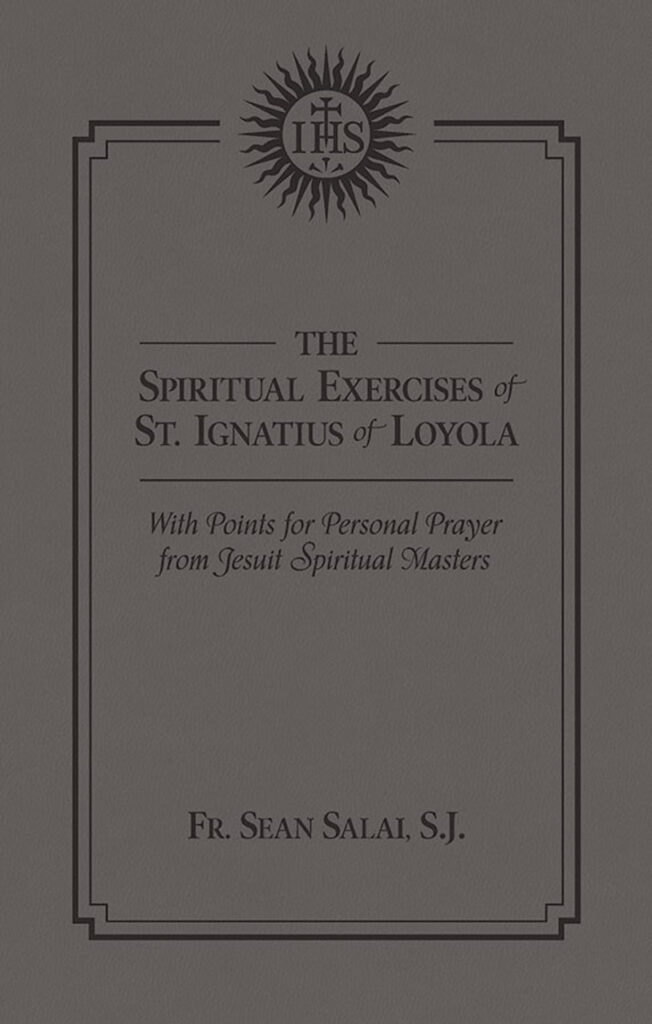Saint Ignatius of Loyola is renowned for his Spiritual Exercises. His wisdom and counsel has been a guide for souls for centuries. Meditate with this spiritual master on the mystery of the Holy Trinity.
First Exercise on the Incarnation [The Trinity]
[Editor: Fr. De Place presents this exercise as a “meditation” or mental reflection. But St. Ignatius actually introduces it as a “contemplation” or imaginative prayer that consists of three points and a colloquy after the usual preparatory prayer and three preludes.]
Preparatory prayer.
First prelude.
Recall the mystery—The angel Gabriel was sent from God into a city of Galilee called Nazareth, to a virgin called Mary. The angel being come in, said unto her: Hail, full of grace, the Lord is with thee; thou shalt bring forth a Son, and thou shalt call His name Jesus. Mary said, Behold the handmaid of the Lord, be it done to me according to thy word (Luke 1:26–38).
Second prelude.
Represent to yourself Nazareth and the humble house of Mary, where the mystery of the Incarnation was accomplished.
Third prelude.
Ask the grace of knowing well the infinite charity of the Word incarnate, that you may love Him with more ardor and serve Him with greater zeal.
I. Contemplate the Persons
1. Men spread over all the universe, almost all opposed in manners, characters, passions, interests, and yet almost all agreeing on one point; that is, in forgetting their last end, in offending God, in serving the devil, in dying as sinners and reprobates and precipitating themselves forever into hell.
2. The holy Trinity, which suffices to itself; which finds its happiness in its own perfections, without having need of creatures; and which, instead of overwhelming criminal men with its justice, casts upon them looks of pity and mercy.
3. The blessed Virgin Mary, retired in the humble house at Nazareth and absorbed in prayer.
4. The angel Gabriel descending from heaven and saluting Mary, as Mother of God, full of grace, blessed among women.
Practical reflections and affections.
II. Listen to the Words
1. On earth and among men, words of hatred, of scandal, imprecations, blasphemies.
2. In heaven, words of clemency and charity; the august Trinity, which decrees the incarnation of the Word; the Word, who offers Himself to the Father for His glory and the salvation of man.
3. At Nazareth, the words of the angel Gabriel to Mary: “Hail, Mary, full of grace; the Lord is with thee; blessed art thou amongst women. The Holy Ghost shall come upon thee, and the power of the Most High shall overshadow thee. And therefore the Holy which shall be born of thee shall be called the Son of God” (Luke 1:28, 35). The answer of Mary, who humbly submits to the will of the Lord: “Behold the handmaid of the Lord, be it done to me according to thy word” (Luke 1:38).
Practical reflections and affections.
III. Consider the Actions
1. On earth. The diverse crimes of men; the sacrilegious worship paid to idols and demons; the disorders of their plays, feasts, pleasures; their endeavors to supplant and even to destroy each other.
2. In heaven. The charity of the three Divine Persons toward man; with what love the Father gives us His own Son; the Word consents to become incarnate; the Holy Ghost forms the union of the Divine and the human nature.
3. At Nazareth. The respect of the angel in the presence of the Blessed Virgin; the trouble of Mary on hearing the words of Gabriel; her love for virginity, which she prefers to the honor of the Divine maternity; her humility and obedience to the will of Heaven.
Practical reflections and affections.
Colloquy With the Three Persons of the Adorable Trinity
Adore the infinite charity of God, who deigns to save men, notwithstanding their unworthiness and their ingratitude. [Consider what you ought to say to the Three Divine Persons.] Render thanks to the Word incarnate. Address yourself to Mary, and beg of her to obtain for you the grace of a tender love and faithful imitation of her divine Son.
Anima Christi. Pater. Ave.
ooo
This article is taken from a chapter in The Spiritual Exercises of Saint Ignatius with Points for Prayer from Jesuit Spiritual Masters by Dr. Sean M. Salai, D. Min which is available from TAN Books.









